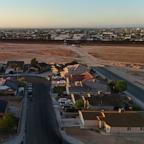Hundreds of US counties lack sufficient air quality monitoring
Cities, counties and government agencies use air quality monitors to measure the pollutants and particulates that can cause significant health problems. However, according to a new report, hundreds of counties across the United States lack these essential measurement tools.
According to the American Lung Association’s 2024 State of the Air report, more than two-thirds of U.S. counties do not have official ground-based air quality monitoring stations. As a result, dangerous levels of pollution are going undetected and unaddressed.
The association used satellite data to estimate that 300 of the 2,700 U.S. counties with incomplete or no air monitoring data had potentially failing grade levels of fine particulate matter between 2020 and 2022.

Lexi Popovici, lead report author and a senior manager of the American Lung Association, said satellite data could help fill the data gap left by the missing air monitors and help people and officials, particularly in rural areas, take protective measures. She said the technology could also supplement existing ground monitors and ultimately create a more comprehensive air quality monitoring system.
"Using satellite data actually helps fill in those gaps to identify pollution in places that might otherwise go undetected, and this can help millions of Americans understand what air quality they are breathing," Popovici said.
Earlier this year, the Environmental Protection Agency introduced a more stringent national annual average standard based on the risk to human health.
Fine particulate pollution is a mix of solid or liquid particles suspended in the air – smaller than a strand of human hair – that can be present even in air that looks clean, according to the EPA. These pollutants are considered the most dangerous forms of air pollution and are linked to asthma, lung and heart disease, and other respiratory health issues.
Popovici said subsequent reports will focus more on the potential of community air quality resources and ways to mitigate environmental injustices.
--ABC News' Gaby Vinick







